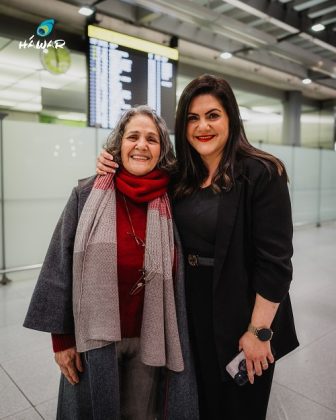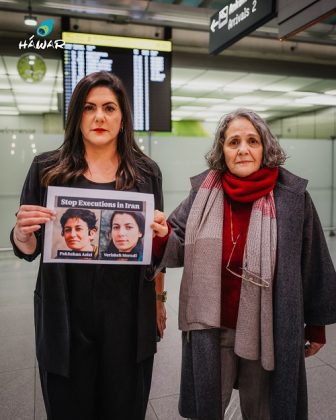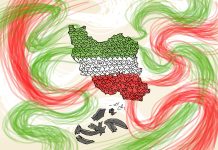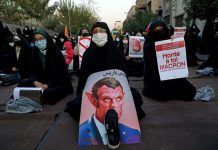Nahid Taghavi, a 70-year-old German-Iranian women’s rights campaigner who was arrested in Tehran in October 2020 while on a visit to the country, was released from prison in Iran and returned to Germany on Jan. 13. Her release was announced on that day by her daughter Mariam Claren on the social media platform X.
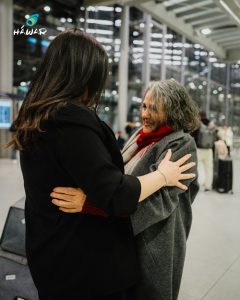
Meanwhile, France, whose citizen Olivier Grondeau is being held hostage in Iran, accused the Islamic Republic of torture on Jan. 10. Taghavi, who had been sentenced to 10 years in prison on what Amnesty International called “fabricated national security charges,” spent more than four years in Tehran’s notorious Evin prison. She was subjected to solitary confinement for more than seven months, was forced to sleep on the floor without a bed or a pillow, and given 30 minutes of fresh air a day while blindfolded, Amnesty International reported in a Jan. 13 release. Amnesty said Taghavi’s prison conditions were “cruel and inhumane.”
“My mother has finally come home. We don’t have the words to describe how happy we are,” Claren said in the press release. “At the same time, we are grieving the four years that were taken from us and the horrors she had to endure at Evin prison.”
Why was Taghavi released?
“One reason might be the relative weakness and current isolation of the Iranian regime: its so-called axis of resistance consisting of proxy armies in Lebanon, Syria and with Hamas in Gaza has been dealt crushing blows,” Düzen Tekkal, the CEO of the Berlin-based human rights organization Hawar, told Kayhan Life. “Another factor is the turmoil within Iranian society itself, especially after the murder of Jina Mahsa Amini in 2022 and the freedom movement that arose soon after.”
“Nahid’s arrival in Germany comes one day ahead of talks in Geneva with Germany, France and the UK concerning a renewed nuclear deal that is currently on ice after the US withdrew in 2018. The regime’s strategy seems to be to regain trust with these three European partners first, which could bring the incoming Trump administration back to the negotiation table,” Tekkal said. “This could result in lifting significant international sanctions that are in place right now. It is not too far-fetched to assume that Nahid has been released to regain Germany’s favor in these talks.”
Tekkal also pointed to the ongoing protests in Iran by laborers and pensioners in the midst of a severe economic crisis in the country, as well as demonstrations held by the Bazaaris — shopkeepers and merchants who have traditionally been staunchly loyal to the regime.
“It is possible that there were more concessions by Germany in the background in exchange for Taghavi’s release that we don’t know of,” Tekkal noted.
Tekkal’s organization Hawar was involved in efforts to secure Taghavi’s release alongside an extensive campaign launched by Claren.
“There are many more prisoners of conscience like my mother who are still imprisoned in Iran. Hundreds are at risk of being executed,” Claren said in Amnesty’s press release. “The Iranian authorities must no longer enjoy impunity for their actions.”
Meanwhile, Grondeau, one of three French nationals currently detained in Iran, revealed his identity on Jan. 13 in an audio message broadcast by French radio station France Inter. Grondeau declared that he and two other French hostages — teacher Cecile Kohler and her partner, Jacques Paris — were “exhausted.”
“You have a responsibility to ensure the survival of three human beings,” he said in a comment that appeared to be aimed at the French government.
Therese Grondeau, Olivier’s mother, said on the radio program that her son made the decision to break his silence following failed diplomatic talks.
“Olivier said it was time to contact the media. It had been two years of detention and so he said ‘now let’s go,’” she said on France Inter. “So his friends and family started slowly to prepare for this moment.”
Grondeau was arrested in Shiraz in October 2022, and sentenced to five years in prison for “conspiracy against the Islamic republic,” charges which Grondeau and his family deny. France summoned Iran’s ambassador on Jan. 10 to protest the detention, and described the three detained French nationals as “state hostages.”
Their “situation is intolerable, with undignified detention conditions that, for some, constitute torture under international law,” the French foreign ministry said.
Concerns about Iran’s treatment of its prisoners have been raised repeatedly by the United Nations and several human rights watchdogs, including the deaths of detainees under mysterious circumstances.
Italian journalist Cecilia Sala, who was released on Jan. 8 following her arrest on Dec. 19 on unnamed charges, said she had been subjected to solitary confinement while in prison. Her arrest took place three days after Iranian engineer Mohammad Abedini had been detained by Italian authorities on suspicion of supplying drone technology that led to the deaths of three US soldiers.
EXCLUSIVE: Why Islamic Republic Allowed Prompt Release of Italian Reporter
Abedini was released on Jan. 12, after Italy’s Justice Minister Carlo Nordio made a request to Milan’s court of appeal to overturn Abedini’s arrest.
“The incoming U.S. President demanded that Sala be exchanged for Abedini and that the case be resolved before he took office on Jan. 20, as he did not want the new administration to be involved in a matter that, according to Trump, would only create a headache,” a source from Italy’s Ministry of Foreign Affairs said, according to an exclusive report by senior Kayhan Life journalist Ahmad Rafat.
In addition, a Swiss national arrested in Iran and accused of spying died in prison on Jan. 9, according to a report by Iranian state media.
The man, who has not been named by Iran officials, reportedly took his own life in Semnan prison, according to the judiciary-run Mizan news agency. The Swiss Embassy has started the process of repatriating the man’s body, which has now left the prison and has been transferred to the capital city of Tehran.
There are at least four other foreign nationals currently detained in Iran:
- Mehran Raoof, a British-Iranian labor activist who initially chose not to publicize his arrest in 2020, but has since made his detention public. Raoof has spent more than 1,500 days in prison on national security charges
- Abdolrasoul Dorri-Esfahani, an Iranian-Canadian accountant and an advisor to the Central Bank of the Islamic Republic of Iran, who is accused of spying for the UK and the US, has spent more than 3,000 days in prison following his arrest in 2016
- Ahmad Reza Djalali, an Iranian-Swedish lecturer and researcher, detained since 2016, who has spent more than 3,100 days in prison after being sentenced to death for espionage
- Nazak Afshar, a French-Iranian woman and former member of staff at the French embassy in Tehran, who was convicted in 2009 of spying and of acting against Iran’s national security. Afshar spent 3,215 days in detention and was released for urgent medical treatment in France that same year. The Iranian government sentenced Afshar to a six-year prison term in 2016, which Afshar appealed. She has chosen not to publicize her case.

